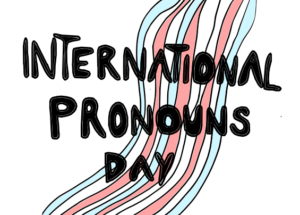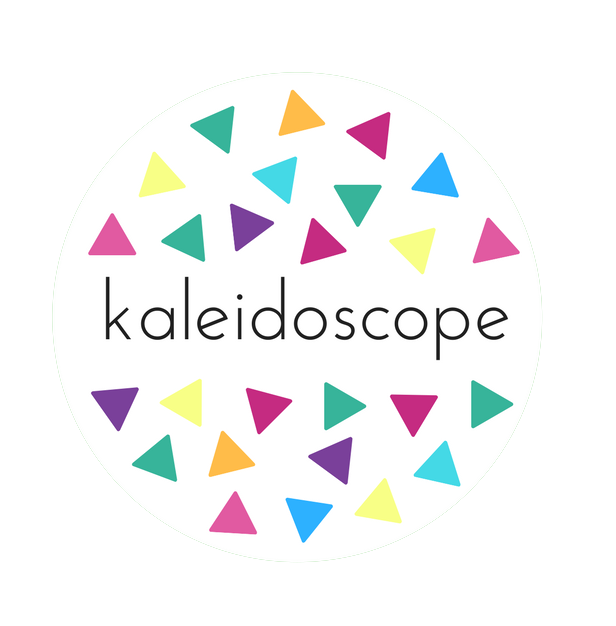
October 20th is International Pronouns Day which seeks to normalise respecting, sharing, and educating about personal pronouns. Specifically, this day is referring to the pronouns that a person wants to be referred to by in the singular third person. For example, “she”, “he”, “they”, “xe”, a combination of these or no use of personal pronouns at all (this article provides more information on how to use personal pronouns).
We’ve been taught that we can recognise someone’s gender based on their appearance or name and use this information to decide what pronouns we will be using to refer to them. However, while you might be able to see the way that someone expresses their gender, you can’t necessarily know what someone’s gender identity is or the language that they feel describes them best. All pronouns can be used by any gender, “he” does not equal man, “they” does not equal non-binary, and so on and so forth. Using someone’s correct pronouns is a form of basic respect and inclusivity and assuming someone’s pronouns can be not only inaccurate but also harmful. So, what can you do?
Usually when you don’t know yet someone’s pronouns it is acceptable to use “they/them” as a gender-neutral option. The only way to know someone’s pronouns is by asking them. This video gives more information on how you can approach this in a respectful way. While asking someone’s pronouns is generally okay, it shouldn’t be done in a way that puts trans and gender nonconforming people on the spot. For example, if you are with a group of people, it’s generally not okay to only ask the pronouns of the person that you perceive as trans or gender nonconforming. So, it’s important that you assess your surroundings before asking to prevent making people uncomfortable. For us to be inclusive, we need to make sure that we are not only asking people that we think are trans. It’s not always possible to tell who is trans and who isn’t and assuming ‘looking cisgender’ allows you to tell someone pronouns reinforce the harmful notion that gender must look certain ways.
Because of this, it is important to normalise and create space for people to share their pronouns. You can do this by introducing yourself with your pronouns, having your pronouns visibly in your email signature, social media, zoom name, etc. This should never be mandatory, and there are very important and valid reasons why someone would choose not to do this. For example, they might be gender questioning or not comfortable with other people knowing about their gender identity in that space. If this is not the case for you, then I invite you to think about why is it that you might not have your pronouns on display? If you are cisgender, why do you think people would be able to know what your pronouns are? and how does this fit the harmful notion that you don’t need to share your pronouns because people should be able to tell what these are? I recommend this video if you are interested in exploring this further.
Once you know someone’s pronouns it is important that you always use these, even when the person is not present. If you get it wrong always correct yourself and move on. Not correcting yourself can be very invalidating and frustrating for the other person. As a non-binary person who uses “they/them” pronouns, I personally feel that not making a big deal out of getting it wrong is as important as people acknowledging they’ve made a mistake and trying to rectify it. While a short sincere apology can be appreciated, over-apologising can make the situation more uncomfortable. When you apologise profusely, it stops being about the other person’s feelings and the harm that you may have caused, and it becomes about your feelings. This is because the misgendered person is put in a position where they not only need to deal with the way that they feel about being misgendered, but they also need to comfort and reassure you.
Now, you got it wrong and you feel bad about yourself. It’s a normal feeling, we generally feel that way when we hurt someone unintentionally. Try not to make it about you, it doesn’t mean you are bad person. In my experience cisgender people often seem so uncomfortable with the idea of being perceived as “not good enough of an ally” or so scared of saying “the wrong thing” that they would become avoidant on the subject, not recognising when they get it wrong or avoiding using any pronouns to refer to me, and this can end up doing more harm than good. Getting it wrong might make you feel uncomfortable about yourself and that’s okay. We are all learning, we all make mistakes and we all need to sit with the discomfort that comes from that. The best thing we can do is hold ourselves accountable and rectify our behaviour, so we make sure we don’t keep hurting people in the future. The only thing we can and should do is put in the work so you can do better and get it right. Remember that while for cisgender people this might be a minor inconvenience, one interaction of many, for trans and gender nonconforming people it can be many interactions daily. Being misgendered can trigger or increase feelings of gender dysphoria, make you feel like you don’t belong in that environment, that you’re not seen for who you are and respected, or even feel like you’re an inconvenience, all of which can have a negative impact on someone’s mental health.
A lot of it is to do with practice and always correcting yourself. Now if you keep getting it wrong, I invite you to think about why that might be. Are you seeing us for who we are, or are you trying to use the correct pronouns but still seeing us as our sex assigned at birth and is this reflecting in your language? While using the correct language is the minimum, the real work comes from putting the energy to see the person for who they are. Deconstructing your idea of binary gender and what it means to be a woman or a man and changing the way you perceive people not only will help you to get the language right, but it will also allow you to see people fully as they are.
I would like to end just by saying that pronouns and language in general are very important, but it is not the only thing we should be focusing our energy on. While it might seem that supporting trans rights is something that cisgender people do to be a good ally, trans liberation benefits all, including cis people. We are all affected by gender norms and stereotypes, not only trans and gender nonconforming people. Breaking these norms and giving space for everyone to be who they are and express themselves in whatever way they choose is beneficial for all of us. In the words of Shon Faye "Trans liberation will free us all".
Glossary of terms (taken from Stonewall)
Ally
A (typically) straight and/or cis person who supports members of the LGBT community.
Cisgender or Cis
Someone whose gender identity is the same as the sex they were assigned at birth. Non-trans is also used by some people.
Gender dysphoria
Used to describe when a person experiences discomfort or distress because there is a mismatch between their sex assigned at birth and their gender identity. This is also the clinical diagnosis for someone who doesn’t feel comfortable with the sex they were assigned at birth.
Gender identity
A person’s innate sense of their own gender, whether male, female or something else (see non-binary below), which may or may not correspond to the sex assigned at birth
Non-binary
An umbrella term for people whose gender identity doesn’t sit comfortably with ‘man’ or ‘woman’. Non-binary identities are varied and can include people who identify with some aspects of binary identities, while others reject them entirely.
Trans
An umbrella term to describe people whose gender is not the same as, or does not sit comfortably with, the sex they were assigned at birth.
Trans people may describe themselves using one or more of a wide variety of terms, including (but not limited to) transgender, transsexual, gender-queer (GQ), gender-fluid, non-binary, gender-variant, crossdresser, genderless, agender, nongender, third gender, bi-gender, trans man, trans woman, trans masculine, trans feminine and neutrois.
Responses


Hi Kat,
Just wanted to say what I brilliant article I think this is. Very helpful. And the Maud Mostly video you've linked to is fantastic. As a cisgendered person, this sort of thing can be quite a lot to get your head around, but articles like this really help. I think fear of saying the wrong thing is probably the biggest barrier to saying the right thing, so knowing that we're all going to make mistakes occasionally, that that's ok - we apologise and move on - and we just try to do better next time is really reassuring.
Best wishes,
Emma (she/her)
Hi Emma,
Thank you for your comment! I’m glad you found the article helpful. I really like what you said “fear of saying the wrong thing is probably the biggest barrier to saying the right thing”. I hope that having more open conversations about this will help us all move forward!
The video links seem to be no longer available on Youtube. Could anyone direct me to good videos explaining the importance of pronouns please?
Hi Janine,
Stonewall has more resources which might be helpful:
https://www.stonewall.org.uk/workplace-trans-inclusion-hub/beginner’s-guide-pronouns-and-using-pronouns-workplace
https://www.stonewall.org.uk/about-us/news/international-pronouns-day